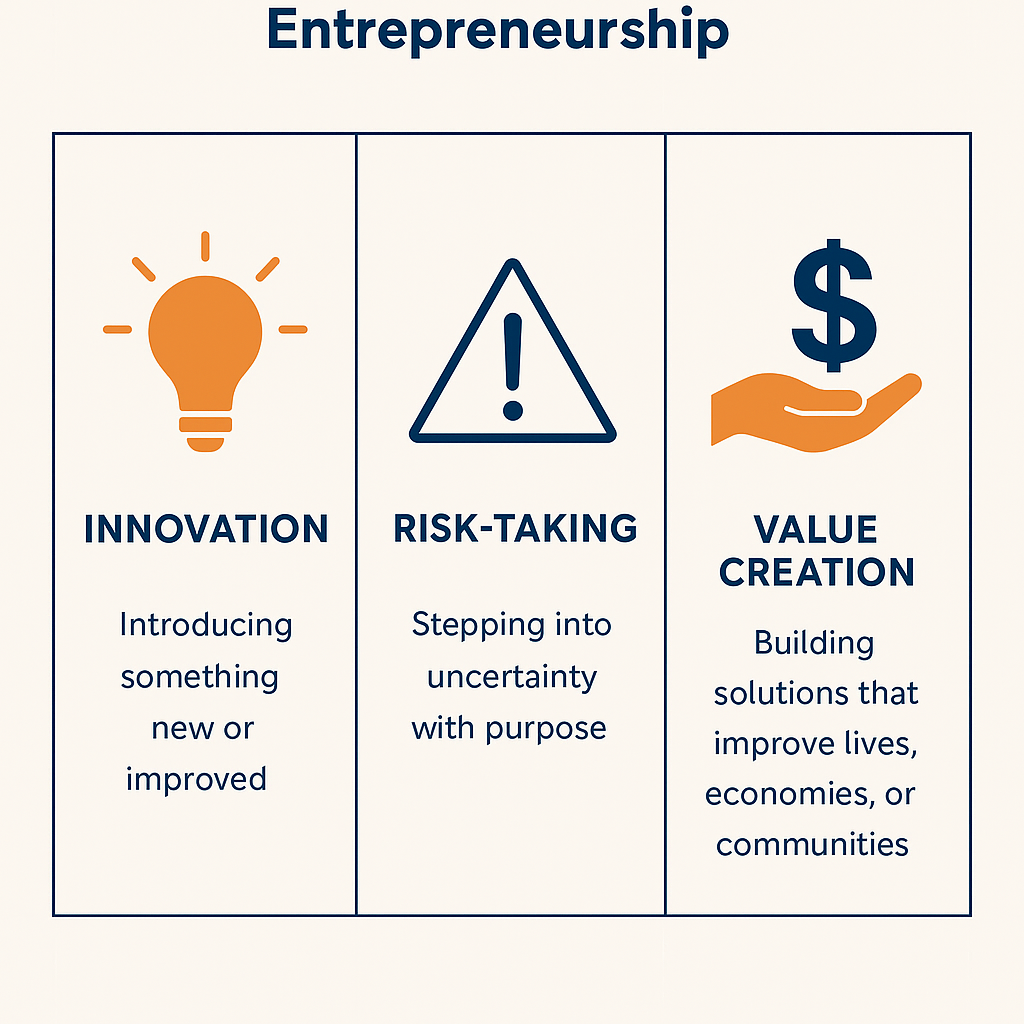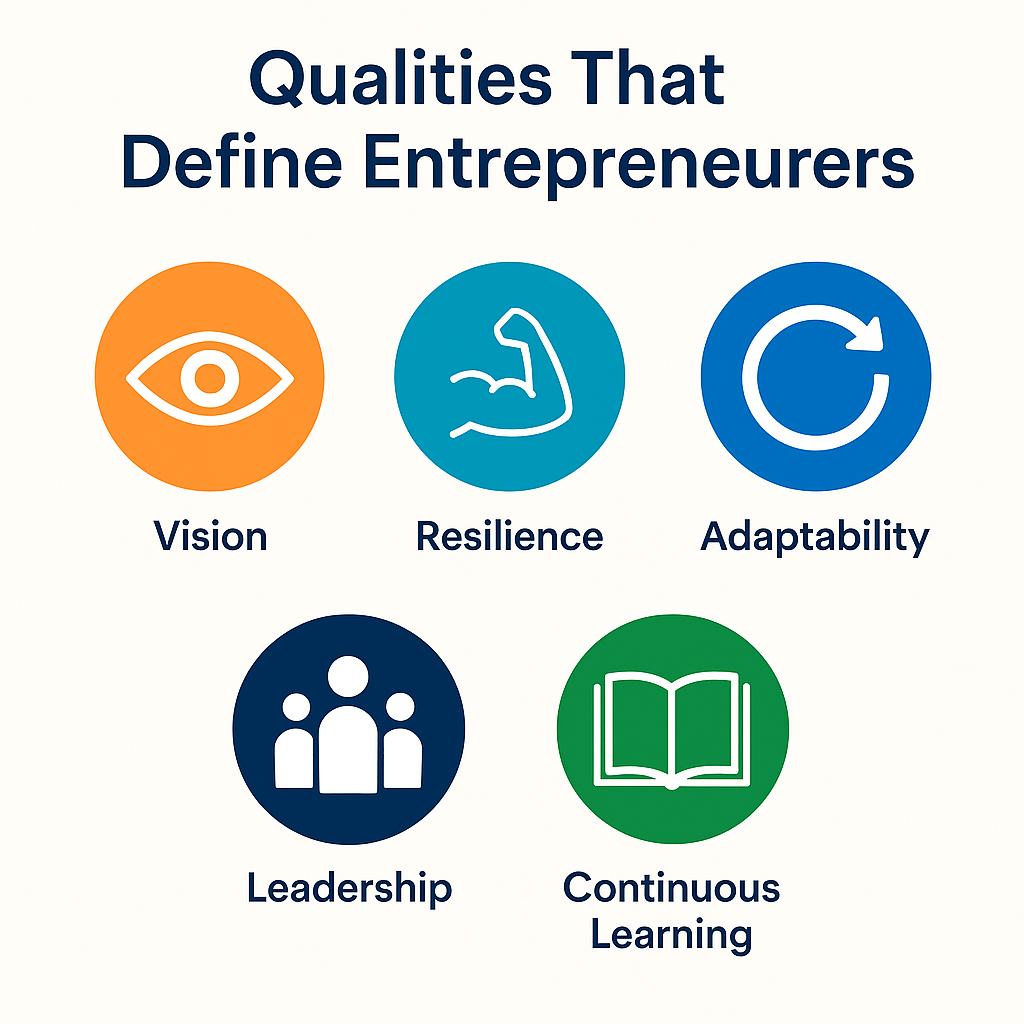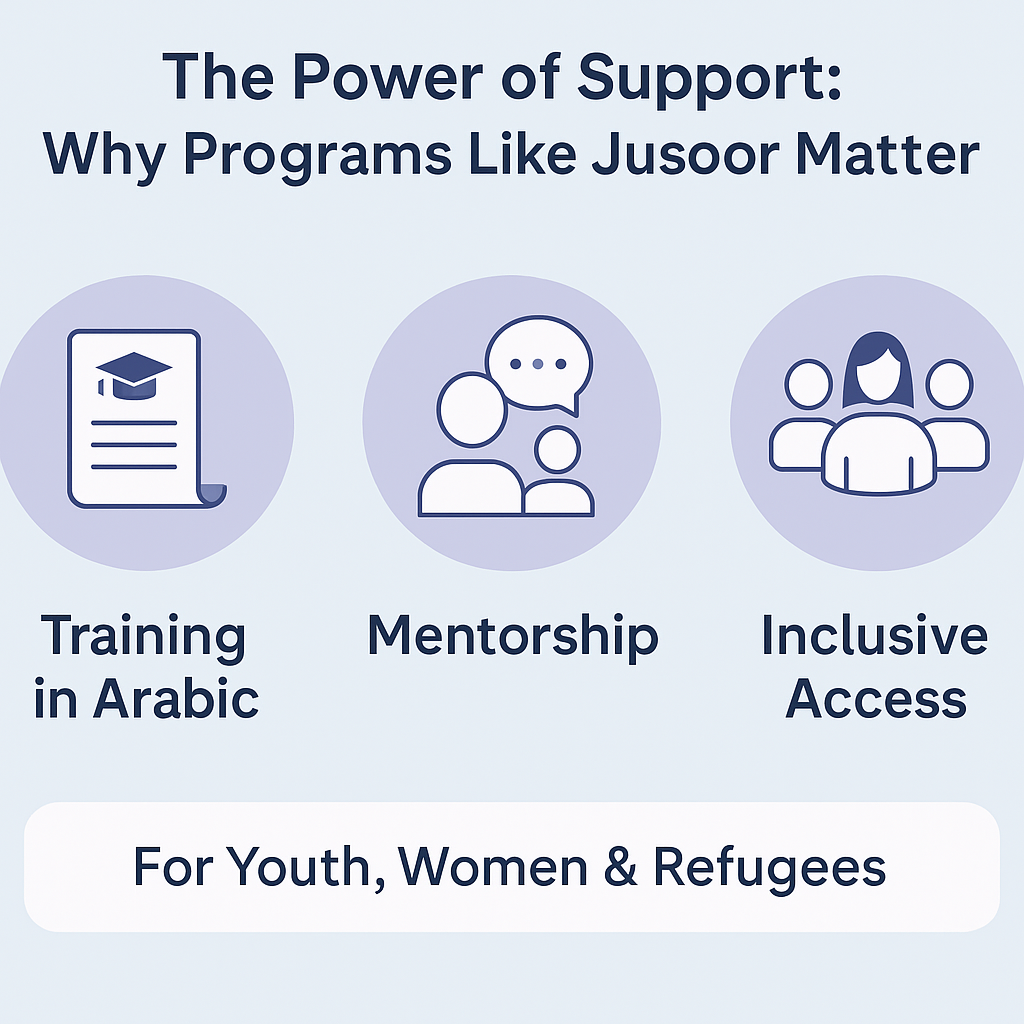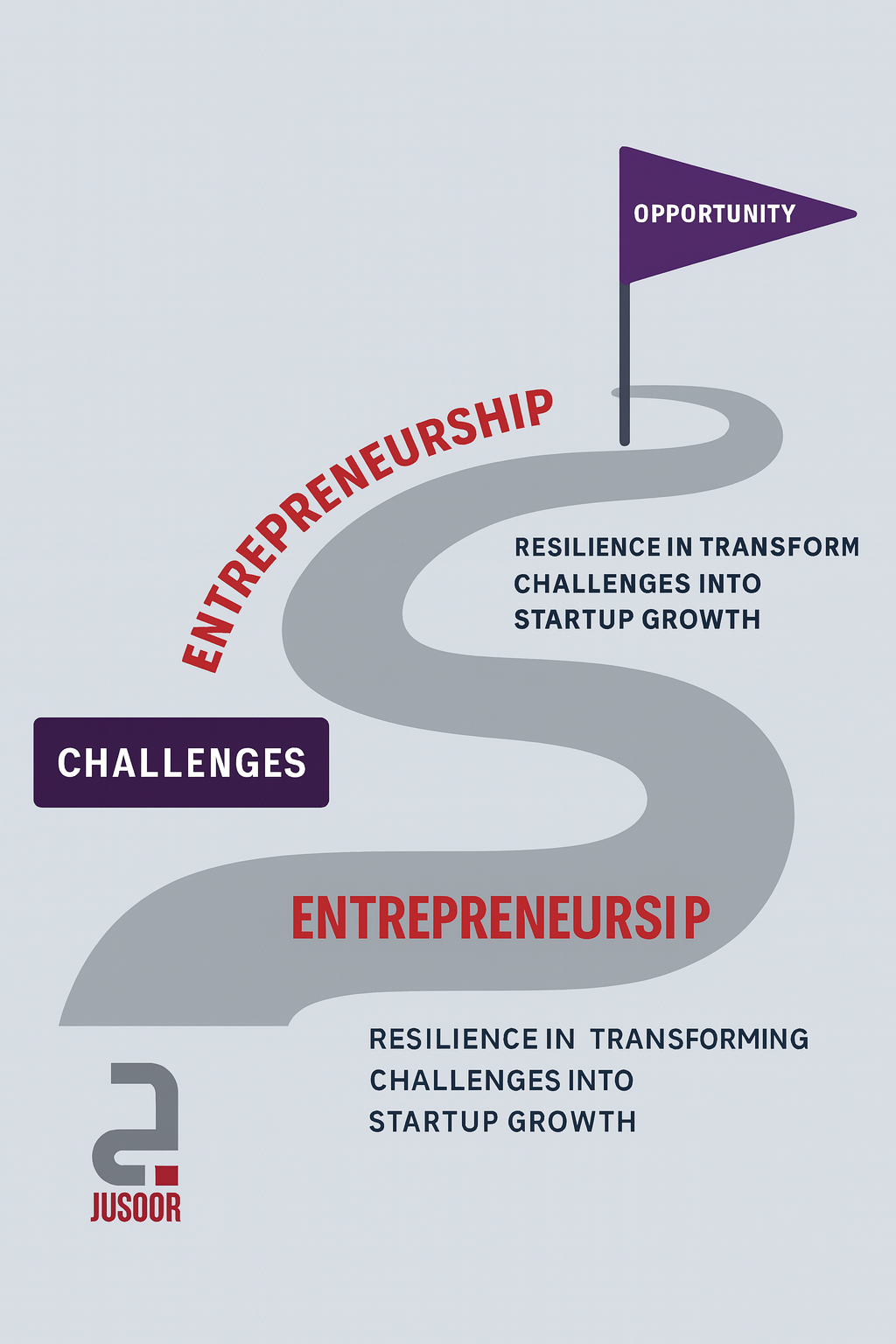Why Entrepreneurship Matters More Than Ever
“Entrepreneurship is living a few years of your life like most people won’t, so you can spend the rest of your life like most people can’t.”
This quote perfectly encapsulates the grit and long-term payoff behind entrepreneurship. More than ever, entrepreneurship has become not just an option but a necessity—especially for youth. In the United States, the Global Entrepreneurship Monitor (GEM) 2023–2024 reportM shows that 24% of young adults aged 18–24 are currently entrepreneurs, with another 21% intending to start businesses in the next three years Babson Thought & Action. This highlights a growing trend where younger generations are leading the charge in entrepreneurial activity worldwide.
In regions like MENA, youth unemployment remains stubbornly high, pushing many to take matters into their own hands—creating opportunities rather than waiting for them. Entrepreneurship has become a powerful force for economic resilience and social mobility.
What Is Entrepreneurship?

Entrepreneurship is the art of spotting opportunity and taking bold action to create something of value. It rests on three pillars:
- Innovation: Introducing something new or improved.
- Risk-Taking: Stepping into uncertainty with purpose.
- Value Creation: Building solutions that improve lives, economies, or communities.
Unlike self-employment or small-scale survival ventures, entrepreneurship especially scalable entrepreneurship—has the potential to transform markets and society.
Why Entrepreneurship Matters: Impact Beyond Business
Entrepreneurship is not simply about starting a company; it’s about shaping lives, economies, and communities. Small and medium-sized enterprises (SMEs) already account for over 60% of global employment (OECD), and in MENA, where youth unemployment exceeds 25%, every startup creates critical opportunities.
We see this impact firsthand at Jusoor. Mujaz, a digital storytelling startup, began with the idea of celebrating Arab culture online. Today, it not only amplifies Arabic identity but also employs young creatives. ShipDip, another Jusoor alum, started as a response to shipping frustrations and now operates cross-border logistics for thousands. These stories show how solving everyday problems can ripple into job creation and innovation.
Entrepreneurship also drives economic and social change. From Careem’s transformation of urban mobility in the Arab world to Jusoor-supported women founders building eco-friendly packaging startups, entrepreneurs are solving problems governments and corporations alone cannot.
Types of Entrepreneurship: Diverse Roads to Impact
- Small Business Entrepreneurship: Think family-run cafés or local mechanics—stable, rooted, community-focused.
- Scalable Startups: Ambitious ventures built to grow fast—like Kitopi or Anghami in MENA.
- Social Entrepreneurship: Profit with purpose—creating businesses that tackle education, health, or environmental challenges.
- Intrapreneurship: Innovators within large organizations, launching new revenue streams or products.
- Lifestyle Entrepreneurship: Passion-driven ventures that prioritize personal values and freedom over scale.
Qualities That Define Entrepreneurs

Entrepreneurs rarely fit into one mold, but there are qualities that almost always stand out. One of the most important is vision and creativity. Entrepreneurs have a way of seeing possibilities where others only see problems. Elon Musk famously imagined a world where electric cars could compete with traditional vehicles and reshaped the automotive industry. Closer to home, Jusoor-supported founders like Mujaz took a challenge — the lack of high-quality Arabic cultural content online — and turned it into an opportunity by building a platform that celebrates Arab identity while creating jobs for local creatives. You can read more about their journey in our community blog.
Resilience and adaptability keep founders going when plans fail. Safa Qassim, a Jusoor alum, embodies this spirit. She moved across job markets, adapting her skills and ultimately building training programs for others navigating unemployment. Her ability to pivot and lead by example captures exactly what resilience looks like in practice.
Equally vital is leadership and communication. Successful entrepreneurs are not lone wolves; they build and inspire teams, negotiate with partners, and win over customers. In Jusoor’s programs, we often see that the most successful founders are those who know how to bring people along with their vision, not just push an idea forward on their own. Leadership is about listening as much as guiding.
Another quality is risk management. It’s easy to say entrepreneurs are risk-takers, but in truth, they are more like risk managers. They know how to balance bold moves with caution — when to invest, when to hold back, when to pursue growth, and when to consolidate. This balance is especially critical in regions like MENA, where access to funding is uneven and regulatory barriers can raise the stakes.
Finally, continuous learning is a hallmark of every great entrepreneur. Whether through formal education, accelerator programs, or trial-and-error experience, entrepreneurs are constantly seeking knowledge. Many of our alumni speak about how Jusoor’s mentorship programs gave them new insights into fundraising, marketing, or product development that changed the trajectory of their businesses. The willingness to keep learning, to seek advice, and to improve — even after success — is what sustains entrepreneurs in the long run.
Why People Choose the Entrepreneurial Path
Many entrepreneurs are drawn to the path because of the freedom and independence it provides. Starting a business allows them to escape the 9-to-5 grind and set their own direction. According to the GEM 2023/24 Global Report, nearly 70% of entrepreneurs cite independence as a key motivator. In our own community, the founders of Mujaz built their digital storytelling platform not just to earn income, but to carve out a career on their own terms while celebrating Arab identity.
Another strong driver is passion and purpose. Many entrepreneurs launch ventures around causes or industries they care deeply about. The GEM report notes that 47% of entrepreneurs globally are motivated by passion. For example, ShipDip grew out of its founder’s frustration with shipping barriers. That personal challenge evolved into a logistics platform now serving thousands, proving that passion can scale into impact (community blog).
The potential for financial upside also pulls people toward entrepreneurship. In regions where salaries are stagnant and public jobs are shrinking, entrepreneurship offers the possibility of higher rewards. A World Bank report highlights that startups are increasingly seen as a source of wealth creation in MENA. Jusoor alumni like Uniex, a fintech startup, are tapping into this reality. In 2024 alone, fintech attracted $644 million in regional funding (MAGNiTT), showing the financial promise of innovative sectors.
For many, entrepreneurship is about leaving an impact and legacy. In emerging economies, it is often necessity-driven. Surveys reveal that more than 40% of entrepreneurs in MENA cite “necessity” as their driver (GEM MENA Insights 2023). Yet necessity often turns into opportunity. Women-led startups in Jusoor’s CWIBL program are not only building income streams for themselves, but also employing other women and uplifting entire families. Their stories show how impact-driven ventures can leave a lasting mark (CWIBL blog).
In developed economies, entrepreneurship is more opportunity-driven — a way to pursue lifestyle flexibility or innovative ideas. But in our region, it often blends necessity with ambition. For many of Jusoor’s founders, the entrepreneurial path is both survival and a chance to create real change.
Challenges on the Entrepreneurial Journey
- Uncertainty & Risk: No guarantees. Markets shift. External shocks—like pandemics—can upend plans overnight.
- Access to Funding: In MENA, early-stage capital remains scarce. MAGNiTT reports that startups raised US$1.9 billion in 2024, down 29% year-on-year, yet still above 2020 levels Arab News MAGNiTT. Fintech led sectors with notable traction: $644 million raised across 124 deals, even amid a 49% drop compared to the prior year MAGNiTT.
- Competition: You're up against local and global players—standing out requires innovation and differentiation.
- Work-Life Balance: Long hours, tight budgets, and emotional strain can lead to burnout.
- Regulatory Barriers: Complex licensing, limited rights for refugees, and bureaucratic hurdles can derail founders.
The Power of Support: Why Programs Like Jusoor Matter

Starting a business is never easy, and in fragile economies, the odds are even tougher for young founders. Research shows that startups supported by targeted training and mentorship are far more likely to survive beyond their first two years. This is why programs like Jusoor’s matter — and why our approach stands out in the Middle East.
At Jusoor, support goes beyond theory. We provide practical, hands-on trainings fully in Arabic, ensuring that founders can learn in the language they are most comfortable with. This makes complex topics like financial planning, investment readiness, and go-to-market strategies accessible and actionable. In the Disruptors program, for example, founders received training on how to build business models, set pricing strategies, and design customer acquisition plans — all taught in Arabic so every entrepreneur could fully engage with the material.
Mentorship complements this training. Each startup is paired with coaches and experts for 1:1 guidance. This gives entrepreneurs the chance to both connect deeply with local mentors who understand the context and gain exposure to global experts who bring international insights. We also invest in soft skills development, helping entrepreneurs practice leadership, negotiation, and communication in Arabic so they can confidently pitch investors, lead teams, and negotiate contracts. At the same time, the mix of Arabic and English in mentorship prepares them for real-world situations where they may pitch international investors or collaborate with foreign partners.
What truly makes Jusoor different is who we serve and how we serve them. While many accelerators in the region focus on already well-connected or well-funded founders, Jusoor intentionally supports youth, women, and refugee entrepreneurs. For example, in the CWIBL program, women-led startups not only gained leadership and digital marketing training but also benefited from tailored mentorship that addressed the barriers women face in accessing finance and markets.
By combining Arabic-language trainings, flexible mentorship, and a focus on underrepresented groups, Jusoor creates an environment where entrepreneurs gain both the local grounding and global perspective they need to thrive.
First Steps: Turning Spark into Startup
The journey from idea to business begins with small steps.
It starts by identifying a problem. ShipDip spotted inefficiencies in shipping and created a solution that now connects thousands across borders.
Next is validating the idea. In CWIBL, an eco-friendly packaging startup piloted with local cafés, refining the product based on customer feedback.
Then comes building a business plan. Jusoor teaches founders to use the Business Model Canvas — a one-page tool mapping out value propositions, customers, channels, costs, and revenues. Uniex used it in Disruptors to clarify their model and pitch to investors.
Finding resources and mentors is critical. In StartMashreq, founders gained guidance from both Arabic-speaking mentors and international experts, helping them navigate e-commerce law and student mobility challenges.
Finally, entrepreneurs must start small and scale smart. One education startup piloted learning content through a WhatsApp group before evolving into a digital platform.
And sometimes, these steps lead to milestones beyond expectations. Eduba, for example, took its early learnings through Jusoor’s programs and grew into a venture strong enough to achieve a successful exit — proof that starting small can end with big outcomes.

The Power of Support: Why Programs Like Jusoor Matter
Jusoor’s approach is unique in the region. All trainings are delivered in Arabic, making complex topics like finance, pitching, and marketing accessible. In the Disruptors program, entrepreneurs learned how to design models, set pricing, and refine acquisition strategies — skills they immediately applied.
Mentorship complements this with 1:1 guidance — sometimes in Arabic, sometimes in English — depending on the mentor’s expertise. This balance gives founders both local grounding and global exposure.
What sets Jusoor apart is inclusivity. Unlike accelerators that target only elite founders, Jusoor works with youth, women, and refugees. In CWIBL, women-led startups gained leadership and digital marketing training, plus mentorship tailored to their barriers.
This approach delivers results. At our Disruptors program finale in Amman, marking Jusoor’s 10th year of entrepreneurship, three winners showcased innovation across industries. Their stories underline how Jusoor’s mix of training, mentorship, and inclusive access turns potential into real-world impact.
Challenges as Launchpads
Entrepreneurship is more than business creation—it’s courage, creativity, and commitment to change. Whether driven by necessity or opportunity, entrepreneurs reshape their futures and uplift communities. The path is tough; the potential is limitless.



